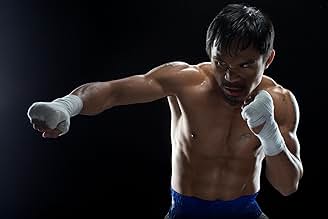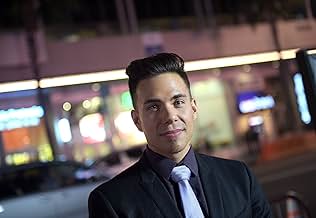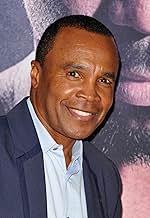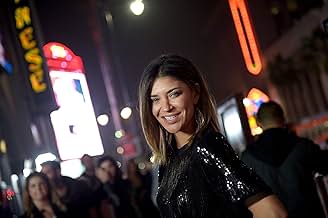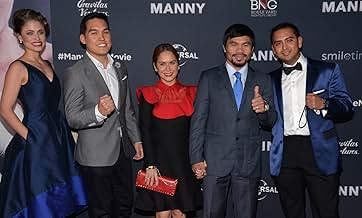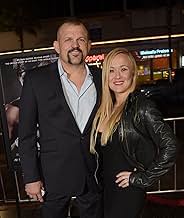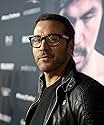Füge eine Handlung in deiner Sprache hinzuWorld Champion. Congressman. Father. Manny Pacquiao fights any obstacle that comes his way. As his home country of 100 million people watches his every move, the question now is: what bridge... Alles lesenWorld Champion. Congressman. Father. Manny Pacquiao fights any obstacle that comes his way. As his home country of 100 million people watches his every move, the question now is: what bridge is too far for Manny?World Champion. Congressman. Father. Manny Pacquiao fights any obstacle that comes his way. As his home country of 100 million people watches his every move, the question now is: what bridge is too far for Manny?
- Auszeichnungen
- 1 Gewinn & 2 Nominierungen insgesamt
Empfohlene Bewertungen
Opening with Michael Buffer's familiar "Let's get ready to rumble", the film does exactly that. Obviously much of the film highlights Manny's boxing career, beginning as an extremely young fighter with a slight build and carrying through to his record-setting titles in 8 weight classifications, but it also does an admirable job of helping us get to know the man behind the fame.
As Pac-Man finds more success in the ring, we witness the exponential growth of the circus environment – his training camp, the media onslaught, the endorsements, the lousy movies, his re-discovery of religion, and his political aspirations. We meet his cutting edge fitness trainer Alex Ariza and his long-time boxing trainer and friend (and former boxer) Freddie Roach. Freddie's story is probably worthy of its own documentary, as he trained under his mentor, the legendary Eddie Futch, and blames his Parkinson's Disease on staying in the game a few fights too long.
The film acknowledges, but only in a cursory manner, the dark side of boxing. Manny's first two managers are blamed for some of his early financial woes, as is his business adviser Michael Koncz and promoter Bob Arum is certainly a guy who deserves a bit more scrutiny. Questionable decisions in key matches are mentioned, but no further investigative reporting is offered handled just as the sport itself does. This hole would be less obvious had not so much of the film focused on Manny's boxing career.
We get a taste of Manny's charm and appeal. Actor and fight fan Mark Wahlberg makes a great observation in his interview, as he points out that Manny's entry into the ring for a fight is filled with smiles and waves as if he had not a care in the world. But then once he steps into the ring, he can "flip the switch" and find the focus to fight his fight. We also see Manny on talk shows, and in a truly priceless sequence, we go into the recording studio as Manny sings "Sometimes When We Touch" while being mentored by the song's original singer/songwriter Dan Hill.
The film does nice work in letting us see Manny make the move into politics – he's now a twice elected representative in his hometown Sarangami province. There is also footage of him in his ministry as he confesses to a sinful past left behind in favor of his family and clean living. Some of the interviews with Jinkee (his wife) are the most emotional moments in the film. Along the way, we are privy to some of Manny's philosophical thoughts: "Loss is a reminder of what's important in life", and when times are tough, "You get back up. You fight again". Manny's talent has etched his place in boxing history, but his approach to life is what contrasts him from many other great fighters like Floyd Mayweather (whose brief appearances flash enough ego to turn anyone's stomach). That hut in the Philippines may be long gone, but the film shows us that Manny is here to stay.
Which, to be clear, is a very good thing.
I have seen a lot of boxing films, and attended a number of live fights. I do believe that Manny by his very example has added a new chapter to the history of the sport. His speed, power, accuracy, and ability to throw at angles that would mystify even a geometry teacher -- these are awesome skills to behold. And his willingness to move outside his weight class, time after time, bespeaks a heart bigger than Wyoming. If not for this film, I would never have seen all this, and for that I thank the film makers.
Which leaves the topic of the film itself. First, what is the yardstick? If you do the research you will find that more feature films (bipic and documentary) have been done on Ali than any other boxer. Fortunately for this review, I have seen them all.
How does Manny compare, as a film? Not very well, I am afraid. It wanders and it lacks focus.
If Manny boxed like the director of this film directed, he would have knocked out while still a teenager.
In fairness, with Ali, there was a natural story arc in the way the entire world gave up on him going into the Foreman fight, and Manny's story lacks that central theme.
That said, it is still a weakish film.
When I first started watching it, I thought it was another HBO boxing documentary but my feelings changed quickly in the first five minutes.
It does not just give you boxing but includes a very nice introspective on Manny the person from when he was growing up until his new perspective on life itself. Most people do not realize all the activities this man is associated with and the movie enables you to get a better perspective on the Pacman.
I really enjoyed it.
A hit in my books!
Wusstest du schon
- Zitate
Pacquiao, Manny: There was a tournament, The Mindanao Open. For one week I fought everyday. I won on Monday, and came Tuesday I won again. On Wednesday, I fought for the bronze medal, Thursday I won silver, and on Saturday I won the gold.
Top-Auswahl
- How long is Manny?Powered by Alexa
Details
Box Office
- Weltweiter Bruttoertrag
- 13.974 $
- Laufzeit1 Stunde 28 Minuten
- Farbe





